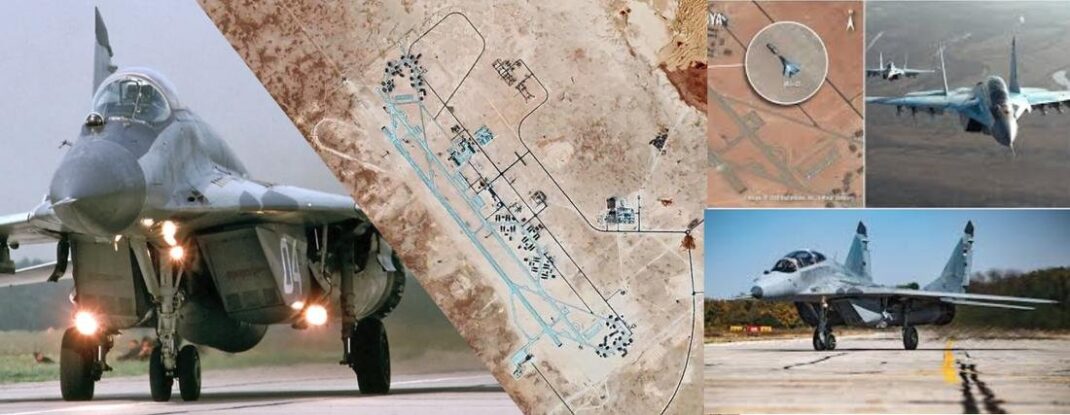By Paul Iddon
 Even though the 14 MiG-29 Fulcrum fighter jets and Sukhoi Su-24 Fencer bombers delivered by Russia to Libya in May have not yet been used in combat in Libya’s civil war, the question of who exactly is piloting these warplanes has already come up.
Even though the 14 MiG-29 Fulcrum fighter jets and Sukhoi Su-24 Fencer bombers delivered by Russia to Libya in May have not yet been used in combat in Libya’s civil war, the question of who exactly is piloting these warplanes has already come up.
A definitive answer could well shed a lot of light on the nature and purpose of this deployment.
In May, these warplanes flew from Russia and made a stopover in Iran’s eastern Hamedan airbase. They then flew on to Russia’s Khmeimim airbase in western Syria, where social media photographs clearly showed that they were unmarked.
Russian Air Force jets then escorted them to Al-Jufra airbase in Libya, which is controlled by the Libyan National Army (LNA) group led by General Khalifa Haftar.
The deployment of these aircraft seemed reminiscent of Russia’s secret military deployment in Syria before Moscow began overtly participating in that country’s civil war on the side of President Bashar al-Assad in late September 2015.
However, in that case, Russia quickly made clear it was directly and officially intervening and participating in the conflict. At present, the Libya case seems quite different.
In Libya, Russia backs Haftar’s LNA, which controls the country’s east.
The group has recently suffered significant setbacks at the hands of its adversary, the U.N.-recognized and Turkish-backed Government of National Accord (GNA) in the nation’s capital Tripoli.
The LNA’s bid to capture Tripoli, after subjecting it to a ferocious siege beginning in April 2019, from the GNA has completely failed and now the group finds itself increasingly on the defensive.
In recent weeks, after suffering a succession of battlefield setbacks afflicted by an emboldened GNA backed by Turkish drone strikes, the LNA called for a ceasefire.
The GNA refused, repeatedly insisting that it will push ahead and capture the strategically-important city of Sirte as well as Al-Jufra.
Had Russia wanted to deter the GNA from making any more advances at the expense of its LNA adversary its deployment of fighter jets might well have been much more overt, as was the case in Syria.
MiG-29s and Su-24s still bearing their distinct Russian Air Force insignia would send a clear and unambiguous message that any attack on them could incur Russia’s wrath and retaliation.
Moscow officially denies transferring these warplanes to Libya, unconvincingly claiming at one stage that the warplanes that showed up in Al-Jufra in May were restored aircraft from the old Libyan Air Force.
Col. Chris Karns, U.S. Africa Command’s (AFRICOM) Director of Public Affairs, correctly pointing out that “Libyans never had MiG-29s or Su-24s in their inventory, so anyone who says they ‘fixed their old planes’ is not representing the facts.”
It remains unclear who exactly is flying these planes. It’s unlikely that the pilots are members of the LNA, especially given how long it would take to fully train them. If they are Russian pilots, they are unlikely flying in an official capacity, especially if these jets remain unmarked.
Some speculate that the aircraft’s pilots may belong to the ostensibly non-state Russian Private Military Contractors (PMCs), possibly ex-Russian Air Force pilots hired by that group.
“There is concern these Russian aircraft are being flown by inexperienced, non-state PMC mercenaries who will not adhere to international law; namely, they are not bound by the traditional laws of armed conflict,” said Bradford Gering, AFRICOM’s director of operations.
That could also mean if any of these warplanes are shot down, or destroyed by a GNA offensive on Al-Jufra, Russia may not retaliate directly, but rather maintain its official line that it’s not involved.
That would also be in line with how its Wagner Group PMCs have operated in the past in places like Syria and Ukraine, as well as Libya itself.
In February 2018, Russian PMCs, most likely Wagner Group paramilitaries, participated in an attack by pro-Assad Syrian militiamen on U.S. troops and allied Syrian Democratic Forces fighters in eastern Syria’s Deir ez-Zor province. U.S. airstrikes promptly repelled that attack, killing scores of the attacking Syrians and an unclear number of the accompanying Russians in the process.
Russia remained quiet about the whole incident. As The New York Times noted, Wagner is “often used by the Kremlin to carry out objectives that officials do not want connected to the Russian government.”
Contrast that incident to the time Turkey shot down a Russian Air Force Su-24 bomber that briefly strayed over its border with Syria back in November 2015.
Moscow responded by bitterly condemning Ankara and slapping sanctions on it until Turkish President Recep Tayyip Erdogan expressed his regret over the incident and sought to repair ties the following summer.
During Egypt’s War of Attrition (1967-70) against Israel, Soviet pilots covertly assisted the Egyptians with Soviet MiG-21MFs bearing Egyptian insignia.
In Operation Rimon 20 on July 30, 1970, Israeli jet fighters set an elaborate ambush in which they promptly shot down four Soviet MiG-21s, killing all four pilots, without suffering any losses of their own.
Moscow, likely out of embarrassment and given the covert nature of its participation in that conflict, sought to keep the incident under wraps.
Israeli Prime Minister Golda Meir, on the other hand, publicly mentioned it a few months later when talking about the Soviet military presence in Egypt.
“How do I know there are Russian pilots in Egypt?” she said. “Very simply because we had shot down four Soviet planes that were flown by Soviet pilots.”
In his 2009 memoir, the Soviet diplomat Yevgeny Primakov recounted meeting Meir a year after Rimon 20, but didn’t mention that particular incident even though decades had passed at that stage.
“If there’s a war, we’ll fight that war,” Primakov recalled Meir telling him before going on to warn, in a clear reference to Rimon 20, “If any aircraft get in our way, we’ll shoot them down.”
Primakov recalled asking Meir to specify who’s aircraft she meant by that, to which she responded by referencing a completely separate past incident. “In 1948 [during the first Arab-Israeli War] we shot down five British planes,” she said.
The deployment of Russian aircraft in Libya today could well prove to be something resembling that covert Soviet operation in Egypt and the much more recent shadowy activities of the Wagner Group.
Consequently, don’t expect Moscow to either take credit or responsibility for whatever its warplanes stationed in Libya do in the near future.
***
Paul Iddon is a freelance journalist based in Erbil, Iraqi Kurdistan who writes about Middle East affairs.
_____________





